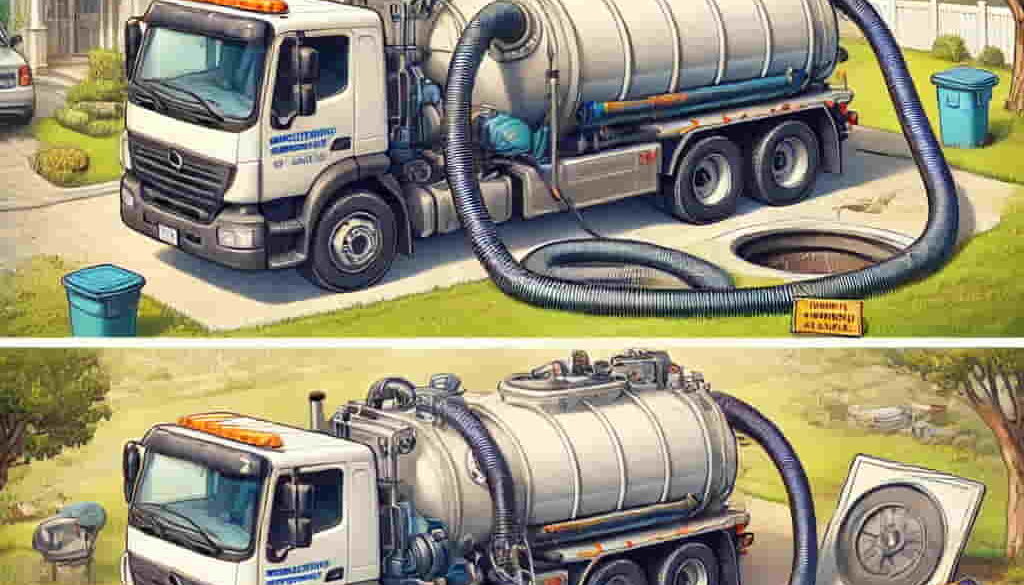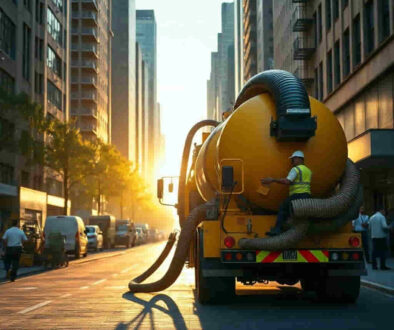How Heavy Rainfall Affects Your Septic Tank and Why Pumping Matters
Rain can be a double-edged sword for homeowners—while it keeps your garden flourishing, it also has the potential to wreak havoc on your septic system. If you’ve ever had the misfortune of dealing with septic system issues after a heavy downpour, you know just how unpleasant—and expensive—the situation can be. For homeowners across the United States, especially those in areas prone to frequent or heavy rainfall, understanding the impact of rain on septic systems and the importance of regular septic tank pumping is crucial.
Let’s dive deep into why rain can be a problem for your septic system and how you can prevent a minor issue from becoming a full-blown disaster.
The Rainfall Dilemma: How Does Too Much Water Overwhelm Your Septic System?
Heavy rainfall can be an issue for any home, but it’s particularly problematic for homes with septic systems. Here’s why:
Soil Saturation and Drain Field Inefficiency
Your septic system relies on the drain field to disperse treated wastewater into the soil, where it’s further filtered. However, when it rains heavily, the soil in the drain field can become oversaturated with water. This waterlogged soil struggles to absorb the wastewater, causing it to sit on the surface or, worse, back up into your septic tank. Think of it like trying to soak up a spill with a towel that’s already soaked—there’s just nowhere for the water to go.
It’s important to note that the soil’s ability to absorb wastewater also depends on factors like soil type and the condition of the drain field. For instance, clay soils, which are dense and have low permeability, can exacerbate issues during heavy rainfall, leading to more significant saturation and slower absorption. In contrast, sandy soils, which are more porous, may handle excess water better but can still be overwhelmed if the drain field is not properly maintained.
Hydraulic Overloading: The Hidden Culprit
Beyond just saturating the soil, heavy rain can also lead to hydraulic overloading of your septic system. This occurs when the amount of wastewater entering the septic tank exceeds its capacity to treat and release it. It’s crucial to understand that hydraulic overloading can happen not just during heavy rain but also during periods of high water usage, such as when you have guests over or during holidays when water demand spikes.
During these times, the septic system is put under additional stress and untreated or partially treated wastewater can be forced out of the tank before it’s properly processed. This can result in wastewater making its way back into your home or emerging from the ground around your drain field, posing significant health risks and potential property damage.
Consequences of a Stressed Septic System
The consequences of a septic system pushed beyond its limits can range from inconvenient to catastrophic:
- Slow Drains and Gurgling Sounds: If you start noticing that your sinks or toilets are draining more slowly than usual or that they’re making gurgling sounds, it’s likely that your septic system is struggling. These are often the first signs of an impending backup.
- Sewage Backups: One of the most dreaded outcomes, sewage backups can occur when the septic tank becomes so full that wastewater has nowhere to go but back into your home. This can be an incredibly costly and unpleasant issue to resolve, not to mention the potential health hazards involved. Exposure to raw sewage can lead to serious health risks, including bacterial infections and exposure to harmful pathogens such as E. coli, Salmonella, and Hepatitis A. These can cause gastrointestinal illness, skin infections, and other serious conditions, particularly in vulnerable individuals such as children and the elderly.
- Water Pooling and Foul Odors: When wastewater can’t properly disperse into the drain field, it can start to pool on the surface. This can create a swampy area in your yard that emits a foul odor, indicating that untreated sewage is leaking onto your property.
- Environmental Impact: It’s not just your home that’s at risk. When a septic system fails, untreated sewage can leak into the surrounding environment, contaminating groundwater and local water sources. This contamination can harm local ecosystems, killing fish and other wildlife, and can also lead to the spread of waterborne diseases in your community. In addition, polluted water bodies can become breeding grounds for harmful algae blooms, which can further disrupt the local environment and pose health risks to humans and animals alike.
The Importance of Regular Septic Tank Pumping
Now that you understand the potential dangers of an overloaded septic system, let’s discuss how regular septic tank pumping can help you avoid these issues.
Prevents Overloading and System Failures
By having your septic tank pumped regularly, you’re essentially resetting the system. Pumping removes the sludge and solids that accumulate at the bottom of the tank, ensuring that there’s enough space for the wastewater to be properly treated and dispersed. This helps prevent overloading, especially during periods of heavy rain.
Regular pumping also keeps your system running efficiently, which can significantly extend its lifespan. A well-maintained septic system can last 25 to 30 years, while a neglected one might fail in just 10 to 15 years. That’s why it’s crucial to stay on top of your maintenance schedule by hiring reliable septic tank pumping companies.
Health and Safety Considerations
A properly maintained septic system is crucial for the health and safety of your household and the surrounding environment. Regular septic tank emptying reduces the risk of untreated sewage leaking out of the system and contaminating your property or local water sources. This is particularly important if your home relies on a well for drinking water, as a failing septic system can lead to bacterial contamination that poses serious health risks.
Cost Savings in the Long Run
While regular septic pumping services might seem like an added expense, they can save you significant money in the long run. The cost of septic tank pumping is far less than the cost of repairing or replacing a failed septic system, not to mention the potential costs associated with cleaning up sewage backups or remediating environmental damage.
When Should You Schedule Septic Tank Pumping?
The frequency of septic tank pumping can vary depending on several factors, including the size of your tank, the number of people in your household, and your water usage habits. However, as a general guideline:
- Every 3 to 5 Years: Most septic tanks need to be pumped every 3 to 5 years. However, this is just a baseline. If your household uses a lot of water or if you live in an area with heavy rainfall, you may need to pump more frequently.
- After Heavy Rainfall: If you’ve experienced unusually heavy rainfall or flooding, it’s a good idea to schedule a septic system inspection. The additional stress on your system might mean it’s time for a pumping, even if you’re not yet due.
- Signs of Trouble: Don’t wait until you notice slow drains, sewage smells, or pooling water in your yard. If you observe any of these warning signs, it’s time to call a septic tank pumping company.
Climate Change and Its Impact on Septic Systems
An additional factor to consider is the increasing unpredictability of weather patterns due to climate change. Areas that historically didn’t experience significant rainfall might now see periods of heavy downpours, which can challenge even well-maintained septic systems. Being proactive about septic tank maintenance is more important than ever in these changing conditions.
For those living in regions where heavy rainfall is becoming more common, investing in a robust septic system maintenance plan can provide peace of mind. This might include more frequent inspections, pumping, and even improvements to the drain field to enhance its ability to handle large volumes of water. Working with experienced septic tank pumping companies can ensure that your system is ready to handle these new challenges.
A Final Word on Septic System Care
Your septic system might not be top of mind most days, but when it fails, it quickly becomes the only thing you can think about. By understanding how heavy rainfall can affect your system and taking steps to maintain it—like regular septic tank pumping—you can avoid the headaches (and nose aches) that come with septic problems.
Think of your septic tank as an essential but often forgotten hero, working tirelessly beneath the surface to keep your home running smoothly. It doesn’t ask for much, but when it does, it’s best to listen. Regular pumping and maintenance will keep it happy and functioning for years to come, allowing you to enjoy the rain without worrying about what’s happening beneath your feet.



